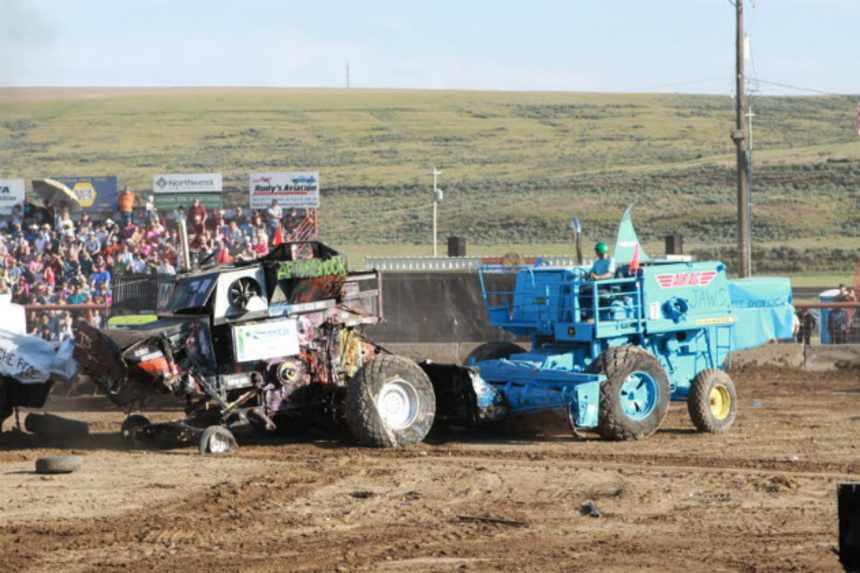Spokane 2015 Review: DRYLAND Combines Demolition Derbies And The Waning Of Wheat Farmers In Washington

O beautiful for spacious skies.
For amber waves of grain.
The Palouse region of the inland northwest is one of the wheat breadbaskets of the world. I recently relocated to this area and frequently commute from my small town of Pullman, home of Washington State University, to Spokane, the nearest and only major city in eastern Washington. Spokane is the cosmopolitan shore of an undulating wheat ocean, and Pullman an island within it.
Dryland is about the stewards of this bounty; the wheat farmers who are struggling to retain their families' way of life. Modern combine harvesters have revolutionized wheat farming, changing the region's family farms into consolidated and ever larger operations, which rely on ever fewer laborers. These factors have conflated to limit no just the opportunities for children to fill their parents' boots, but the very sustainability of small agricultural towns. Towns like Lind, which is the social nexus of Dryland's subjects.
It is therefore with no small irony that we meet the film's subjects, wheat farming sons and best friends Josh Knodel and Matt Miller, on the day of their glorious ascendence to the driving throne at Lind's Combine Demolition Derby. By which I mean, just to be clear, drivers of enormous combine wheat harvesters that are painted up, pimped out, and ploughed into each other until naught but mangled metal carcasses remain. Multiple heats later, thanks only to increasingly desperate repairs by the light of a welding torch, the victor is declared according to ancient custom: last-machine-moving.
These are the circumstances of our introduction, and this too was how the filmmakers met their subjects. Upon wandering into a rural Palouse town they were greeted by a sign that read: "Welcome to Lind. Please drop in... Mount St Helens did." And beneath this: "Combine Demolition Derby!" So drop in they did, and kept doing for a decade, slowly discovering the real story was not the demolition derby, but the trials and tribulations of a farming generation, coming of age in a mechanical era with little room for farmers.
Directors Sue Arbuthnot and Richard Wilhelm shot the film over 10 years, and this affords us something of a Boyhood-esque peek into the slowly maturing lives of Knodel and Miller. In little glimpses - visitations to this pair of families who we slowly come to know - the life of a Palouse farmer is revealed for the serene but serious work that it is. These young men take their responsibility to feed the world seriously, and recognize the privilege it is to still be farming. Towns like Lind are increasingly marginalized, resorting to partnerships with neighboring communities just to sustain basic services like groceries, schooling, and banking.
The plight of these farmers is not a new concern, and this story is being played out in agricultural regions all over the country and world. Still, it struck a somber chord with me because Dryland is not just a poignant portrayal of the changing face of agriculture, but captures the waning of a particular mold of American. Fewer farmers means fewer farmers, and there is something both sad and disconcerting in that notion. Fewer farmers.
I enjoyed fascinating conversations with some of the film's subjects who were on hand after the screening, and their quiet, grounded quality reminded me of farming friends I studied with in my youth (I have a degree in agricultural engineering). Farmers are differentiated by their tangible connection to the earth, while in cities such connection becomes increasingly abstract. Farmers do more than farm produce; their very existence is humanity's major remaining overt connection to the environment. It's worrisome to me that an already tenuous connection is now increasingly threadbare.
And this is the real gift of Dryland; it's expression of these deeper truths beneath. By following its subjects for so long we see these farmers as more than their vocation. We come to sense their bond with the land, and the way their lives entwine work and family and seasons. We see these boys mature into salt of the earth gentlemen, but cannot erase from memory the sight of their glee at the commands of a dieseled demon.
And for my part, I find it very comforting to know that they're out there, keeping us connected to the earth, grounded, and also that they're smashing combine harvesters together.







